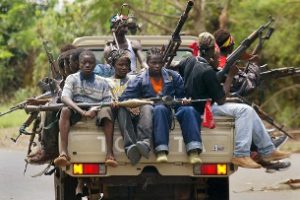As far as I can tell, the people who read my blog are all A) Americans and B) bright people. The two do not always go together, but I have a great deal of faith in my readers. I say that, mostly because you’ll feel better about reading this post if I compliment you this way. (OK, OK, I do think you are bright, too.)
Therefore, since you have these qualities, I have a little thought exercise for you.
Imagine this were the year 1800. You are going to advise democratically-minded leaders in Latin America who want to create new nations out of the colonies there. You know the story about the United States. So what would you tell them they need to establish in order to build a solid democracy?
Think a moment……
(Picture a spinning wheel icon or an hourglass icon here. Imagine “Jeopardy” music in the background….)
Think some more……
Got it?
OK, let us see how you did, compared to what those leaders in Latin America actually did without your good advice.
By 1825, leaders in most of these new nations in Latin America (there were variations, of course) had achieved all of the following (which were all what the U.S. had achieved):
- – they had declared, fought for, and achieved independence from a European “mother” country
- – they had studied Enlightenment ideas of rights, natural law, liberty, and republican forms of government
- – they had written Constitutions
- – they had established republican forms of government
- – they eliminated titles that had granted upper class members aristocratic status
- – the right to vote was granted to landowners
- – economies had shifted from mercantilist dependency on the “mother” country to market-based capitalism
Well, how did you do? How many of these did you get?
Now think about those Latin American leaders. They did pretty well, didn’t they?
Yes, but…..fast forward to about 1980. How were these Latin American nations doing?
Not well.
One-hundred and fifty years after embarking on the project of democracy, most Latin American countries were characterized by the following:
- – military rule, dictatorships, or rule by small oligarchies
- – severe restrictions on the freedom of press, assembly, speech, and religion
- – human rights abuses that included, in many places, the arrest and torture of political opponents
- – tremendous inequality, whereby elites dominated and ruled society
- – economies that had been about the size of the US in 1800 (Argentina and Mexico, for instance), in 1980 were less that 1/3 the size of the US (GDP per capita)
(A brief caveat: many Latin American nations have made great strides toward democracy in the last two decades, which is why I made 1980 the cut-off date. And a few were pretty solid before 1980. Two thumbs up for Costa Rica!)
The United States ended up far more democratic than most Latin American nations. Now, since you are a bright and thoughtful American (I added “thoughtful” because you have read this far in the post) you will not react to this comparison of Latin America with the USA with a declaration along the lines of “Yeah, we are the USA! We are totally awesome! Whatever we do turns to gold!” For, of course, you do not want to imply that Americans are “naturally” better at democracy, or that Americans are God’s favorite children, or that Americans are just plain entitled. You do not want to assume the attitude of Ryan Lochte talking to police in Rio after trashing a gas station bathroom. No.
Instead, because you are thoughtful and bright, you are saying this to yourself: “Hmm, this is interesting. Latin American countries had so many elements of democracy, including (perhaps) a few I had not thought of. Why didn’t they turn out democratic?”
Yes, that is the question you are asking yourself. Good job.
And here is the answer to the question of why democracies did not develop in Latin America: I don’t really know, completely. (But I have ideas.)
You don’t really know, completely, either. (You probably have ideas, too,)
But it is a good question for you to ask, because it will lead to deeper thinking and understanding about how democracies are built and how the world works. It is something I have been wondering about since some dramatic experiences in Kenya.
First observation: democracies are complicated and difficult to establish.
The characteristics listed above do not, alone, insure a democracy will develop in a nation. But what else do they need?
Homework: think about that one before my next post.





